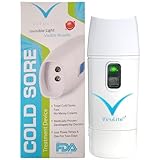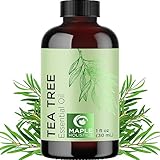Cold sores don’t look nice, and they hurt a lot. That’s most likely to be the reason why you want to find the quickest way to get rid of a cold sore. You want an at-home treatment that’ll deliver rapid results!
The over-the-counter (OTC) market has many products that ‘claim’ to heal a cold sore fast, but which ones are actually effective? Are there any home remedies (or all-natural treatments) that are beneficial? Regardless of the method, the key to a successful outcome is taking action immediately.
In this guide, we will let you know which OTC cold sore medicines really work. We’re also going to provide more information about what will and won’t expedite the healing process.
There are ways to recover more quickly, and one of the best ways to achieve that goal is with HERP-B-GONE. This was developed by doctors and has been shown to cut the recovery time to as little as three days when used during the prodromal stage (a tingling sensation).
How to Heal a Cold Sore Quickly
Being proactive can help you heal a cold sore fast. Taking advantage of proven FDA medications and devices is always a positive start. If you are in pain, an OTC painkiller such as ibuprofen or acetaminophen may help.
Making use of natural and alternative remedies can also deliver results. Your goal should always be efficiency coupled with safety.
Let’s take a closer look at four crucial options for healing a cold sore fast.
Light Technology
The top-rated laser light treatment is the FDA-approved Virulite electronic device.Using light technology, the Virulite can significantly shorten the healing time of your cold sore. In fact, if used during the prodromal stage, it can sometimes stop an outbreak in its tracks.[1]
This breakthrough treatment was the first OTC device of its kind.
Quite the departure from messy creams, Virulite is a convenient and straightforward solution that works. Carry it with you when you go to work and apply it as soon as you experience the warning signs.
Only requiring three treatments over the course of two days, the Virulite device is the fastest and most effective option around.
Creams, Gels and Ointments
If used as directed and at the first sign of trouble, OTC creams/gels can heal painful cold sores faster.
Let’s explore 3 of the most notable options:
- Approved by the FDA to shorten healing time, Abreva is the market leader. Designed to penetrate deep into the skin, it can sometimes remove cold sores is only 72 hours.[2]
- Branded as a fast-acting topical balm, HERP-B-GONE is a soothing remedy that works fast. FDA approved, HERP-B-GONE has become one of the proven leaders in cold sore treatment.
- With the ability to dry out active blisters, Campho-Phenique can prevent viral spreading on contact. Best when applied before scab formation, it can dry out cold sores without cracking.
Essential Oils
Home remedies can be effective when treating cold sores. Some work better than others.
Many essential oils can provide relief.[3] Complete with various antiviral, antiseptic, and anti-inflammatory properties, they’re often used in over the counter (OTC) products.
According to Dr. Joshua Zeichner, a board-certified dermatologist based in New York City, essential oils can potentially treat a wide variety of skin conditions. He notes that lab results have shown that antiviral properties are found in many essential oils. By reducing an active outbreak, essential oils can naturally speed up healing time.
Here are three essential oils that can be used to treat and heal fever blisters.
Tea Tree Oil
Regarded as a strong antiviral and antiseptic, tea tree oil has healing qualities. Courtesy of its anti-inflammatory properties, it is also a useful pain reliever.
It can be applied directly to your blister with a clean cotton swab. Limit your application to no more than 2-3 times per day. Quite strong, tea tree oil can irritate your skin if over-used.
Peppermint Oil
This can calm the symptoms of the herpes simplex virus. Most people quickly benefit from a reduction in pain and skin sensitivity.
For best results, apply it to the fever blister via cotton ball. Apply it 2-3 times day, as needed.
Lemon Balm Oil
Said to cut viral advancement by as much as 96%, lemon balm oil can be highly effective.
With an application window of up to 4 times per day, lemon balm oil can be applied with a cotton swab. Diluting each of the essential oils discussed will help to prevent any skin irritation.
If you experience an allergic reaction such as redness, swelling or a rash, cease treatment. We all react differently to specific ingredients, so always heed your body’s warnings.
Alternative Remedies
Despite the fact that many alternative treatments have no HSV-1 healing properties, others can speed up healing and reduce pain and swelling.
Let’s explore some of the natural options:
- Aloe Vera Gel: Complete with anti-inflammatory properties, an aloe vera gel can reduce the swelling associated with cold sores. You can enjoy temporary relief before the ulceration stage.
- Rhubarb and Sage Cream: According to the Mayo Clinic, rhubarb and sage cream might even be as effective as acyclovir which is a strong prescription antiviral cream.[4]
- Propolis: Also known as synthetic beeswax, propolis can accelerate healing if applied during prodromal stage of the cold sore lifecycle.
- Lysine: This is an amino acid that can be consumed as an oral supplement or applied as a topical cream. A diet that’s high in lysine and low in arginine may be beneficial. You can also find lysine-based lip balms and chapsticks.
Why is Treating a Cold Sore at the Tingling Stage Important?
Defined by Abreva as the “Feel. Act. Heal.” stage, treating your cold sore during the prodromal can expedite the healing and recovery process.
Identified as a tingling or burning sensation, cold sores can display symptoms a full 24-48 hours before blister formation. This is a vital clue that can allow you to take swift action.
Spreading from cell to cell, HSV-1 has a rapid growth rate once it becomes active. Treating the virus immediately with an FDA-approved product will keep viral spreading to a minimum.[5]
Fever blisters, if left untreated, can remain active for up to two weeks. Treatment during the prodromal stage can reduce the duration of any outbreak by up to 75%.
Treatment facts:
- The prodromal stage is the best time for treatment.
- Treatment during the prodromal can prevent the virus from spreading.
- Cold sores are more difficult to treat once blisters have formed.
Should a Cold Sore Be Dried Out or Moistened?
Keeping a cold sore moist is recommended. While drying out your fluid-filled blisters can lead to faster healing, it can potentially introduce complications. Cracking, bleeding, infection, and scarring are examples of problems that can be encountered.
The use of active healing agents can shield your fever blisters from dryness and any cracking. Your treatment goal should always be safer healing and not ‘quick fixes.’
The Mayo Clinic recommends getting the following from your healthcare provider:
- Acyclovir
- Valacyclovir
- Famciclovir
- Penciclovir
- Zinc oxide cream
- Medicated lip balms
Why Should a Cold Sore Scab Be Kept Moist?
Making sure that a cold sore scab moist is essential for keeping the scab intact.
When the scab is moist, there is less risk of cracking. You’ll then be able to avoid additional pain and allow the natural healing process to run its course.
The scab stage is critical. It marks the final stage before you’re cold sore free. Any skin damage or infection can be a setback to your recovery.
Lip dryness, of any variety, can be harmful if you carry HSV-1.

Cracked lips (and scabs) can become infected. It is also suggested that a form of lip conditioning is critical. Keeping lips moist at all times can prevent many issues. In the same way that you would keep your lips moist to prevent an outbreak, the same logic applies to protecting the integrity of a scab.
How Fast Can I Recover from a Cold Sore?
Cold sore recovery is relatively short. While minor swelling at the blister site coupled with tender skin is commonplace, these sorts of issues should not last more than a few days. The skin that develops beneath the scab can sometimes be quite tender.
If you’re concerned about the skin being damaged, you can apply a thin layer of aloe vera for protection and to expedite the healing process. It is common for new skin to have a pinkish-red color, but this will typically fade away unless you’ve picked off the scab.
If you continue to experience adverse side effects several days after your cold sores have gone away, you need to consult your physician. It could be a sign of a complex medical issue. Conditions, such as facial eczema, can cause the virus to spread due to the broken skin.
Most people will heal naturally within ten days, but no more than two weeks. Once your scab has flaked away and been replaced by the new skin, the entire process has been completed.
Why Am I Getting Cold Sores More Often?
Recurring cold sores are the result of specific ‘triggers’ that awaken the herpes simplex virus.
Residing in a dormant state in the dorsal root ganglion block (nerve cells near the ear), any form of negative stimulation to this nerve chain can promote a fever blister outbreak.
Once infected with HSV-1, you become a viral carrier for life. Although each outbreak will run its course and go away on its own, there is currently no cure for long-term sufferers.

Some people are affected by the virus far more than others. If your immune system is weakened, it is less able to fight off the virus. If you’re sleeping poorly or have another illness, for example, you could easily get back-to-back cold sores.
Dermatologists from the American Academy of Dermatology note a series of core triggers that can lead to blister development.
- Stress and physical fatigue
- Cold, fever, and flu
- Extreme exposure to the sun
- Hormonal changes (menstruation and pregnancy)
- Lip/mouth trauma such as shaving, dental work, and facial and cosmetic surgery.
Dr. Bruce A. Brod who serves as a clinical professor of dermatology at the University Of Pennsylvania Perelman School Of Medicine stresses the importance of increased medical attention if you have chronic outbreaks.
Dr. Brod stated that prescription antiviral medication could shorten an outbreak if taken within 72 hours of initial symptoms. HSV-1 carriers who have a difficult time keeping cold sores at bay should speak with a board-certified dermatologist. Dr. Brod states that antiviral medication can be used as a form of prevention in severe cases.
Will Popping a Cold Sore Speed Up Recovery?
Popping a cold sore, even if done safely, can have negative consequences.
Popping your cold sore can potentially lead to a secondary bacterial infection. It is not uncommon for blister infections to persist for 2-3 weeks. Severe infections often require an antiviral medication.
Continue with your treatment plan and maintain a hands-off approach. Being impatient and searching for a quick fix is likely to slow down the recovery process.
What Will Happen if I Knock Off a Cold Sore Scab?
Knocking off a cold sore scab accidentally, or intentionally removing the scab from a cold sore, is likely to slow down healing. Other potential issues include pain, bleeding, infection, and scarring.
If your scab has been removed early, you need to cleanse the area gently with some antibacterial soap and warm water. This will remove germs, bacteria, and stem the flow of blood. The pain and swelling can be minimized by applying an ice pack or cold compress directly to the affected area.
Once cleansed, you should apply a healing cream, such as aloe vera gel. Cold sores are still contagious during the scabbing period. Avoid touching your face and wash your hands immediately.
Whatever stage of your cold sore, you can shorten the duration by applying HERP-B-GONE cream. Many products claim to be able to get rid of cold sores fast, but in reality, they don’t have the right ingredients to get the job done.
References
- Dougal G, Lee SY. Evaluation of the efficacy of low-level light therapy using 1072 nm infrared light for the treatment of herpes simplex labialis. Clin Exp Dermatol. 2003;38:713–718
- Treister N.S., Woo S.B. Topical n-docosanol for management of recurrent herpes labialis. Expert Opin. Pharmacother. 2010;11:853–860. doi: 10.1517/14656561003691847.
- Orchard A, van Vuuren S. Commercial Essential Oils as Potential Antimicrobials to Treat Skin Diseases. Evidence-based Complementary and Alternative Medicine : eCAM. 2017;2017:4517971. doi:10.1155/2017/4517971.
- Wang ZY, Xu B, Song YY, Wang GT, Xu HZ, Wang XF, Xue YL, Wang ZY, Yu XP. Inhibition effects of rhubarb ethanol extract on herpes simplex virus infection in vivo. Zhonghua Shi Yan He Lin Chuang Bing Du Xue Za Zhi. 2003 Jun;17(2):169-73.
- Cunningham A, Griffiths P, Leone P, et al. Current management and recommendations for access to antiviral therapy of herpes labialis. Journal of clinical virology : the official publication of the Pan American Society for Clinical Virology. 2012;53(1):6-11. doi:10.1016/j.jcv.2011.08.003.
Last update on 2024-04-28 / Affiliate links / Images from Amazon Product Advertising API




